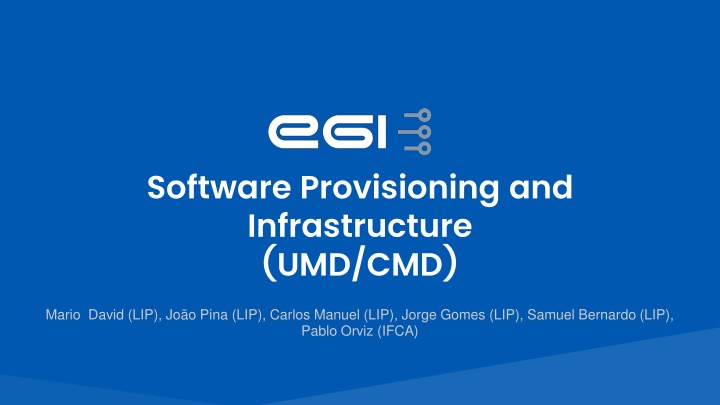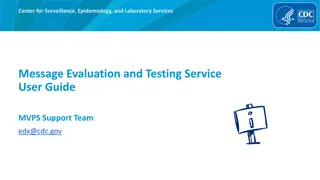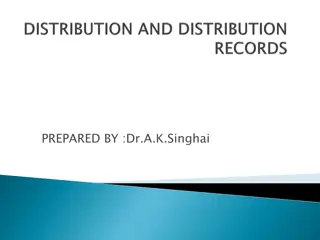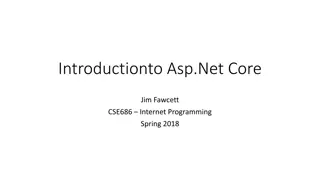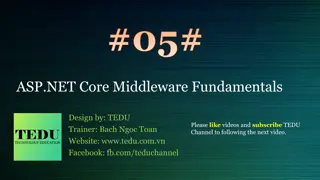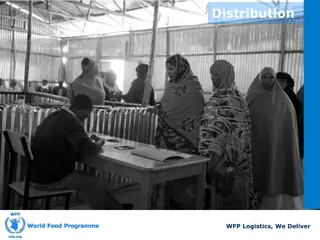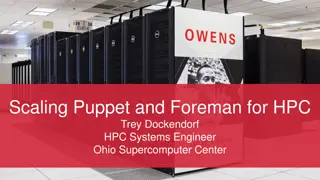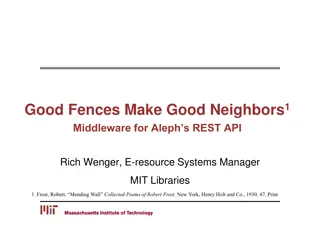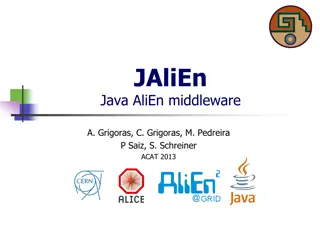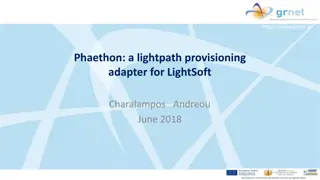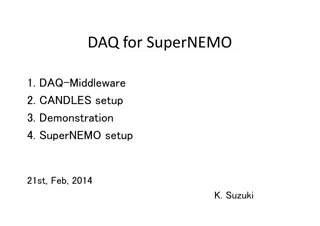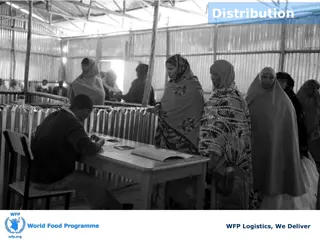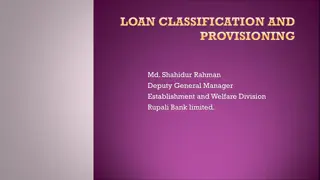Unified Middleware Distribution and Provisioning Infrastructure
The EGI Software Repository provides access for middleware distributions used by WLCG sites. Software Quality Assurance and Validation criteria are key components, managed by IBERGRID and LIP. The latest redesign includes automation, IPv6 compliance, and high availability features. Structure includes release, testing, and contrib repositories for different functionalities.
Download Presentation

Please find below an Image/Link to download the presentation.
The content on the website is provided AS IS for your information and personal use only. It may not be sold, licensed, or shared on other websites without obtaining consent from the author.If you encounter any issues during the download, it is possible that the publisher has removed the file from their server.
You are allowed to download the files provided on this website for personal or commercial use, subject to the condition that they are used lawfully. All files are the property of their respective owners.
The content on the website is provided AS IS for your information and personal use only. It may not be sold, licensed, or shared on other websites without obtaining consent from the author.
E N D
Presentation Transcript
Software Provisioning and Infrastructure (UMD/CMD) Mario David (LIP), Jo o Pina (LIP), Carlos Manuel (LIP), Jorge Gomes (LIP), Samuel Bernardo (LIP), Pablo Orviz (IFCA)
Repositories EGI Repositories The EGI Software Repository provides access for the middleware distributions (used by WLCG sites) together with some Community Repositories Constitutes a contribution from IBERGRID to the WLCG infrastructure Composed by: Software Quality Assurance - validation of the products released as part of the UMD Software Quality criteria - definition of the criterias (done once per product) Software validation of the criteria - run tests against the define criterias (done for every release) Done by IBERGRID since 2012 now LIP + CSIC (ex partners: UPV, CESGA) Contract paid by EGI under competitive call Repositories Infrastructure - provides a unified point of access for the middleware distributions (IBERGRID since 2021) 2
Repositories EGI Repositories Two main categories: The Unified Middleware Distribution (UMD): redistribution of traditional middleware IGTF Distribution of Authority Trust Anchors: packages with the trust anchor information OS Support AlmaLinux9 (EL9) : UMD-5 3
Whats new Complete redesign of the service: Current infrastructure based on Nexus Repository OSS Release workflow implemented in GitHub and Jenkins pipelines. Software Quality assurance - Full-automated approach Faster release cycle with higher automation and less manual intervention New Functionalities: IPV6 compliant New backend behind a proxy (HAProxy) https://repository.egi.eu/sw/production/ (prod) https://repository.egi.eu/software/umd/ (dev) High Availability (server side) Full automatic process until testing Testing -> production (manual git commit) 4
Structure Yum repositories (UMD-5 structure) 1. release: Main repository with all the packages (= to production). 2. testing : testing repository with rpm not fully validated in production environment. RPM belonging to release declared as production ready will be moved from testing to release. 3. contrib: repository for specific communities or special services. (NEW) Dropped repositories: Staged Rollout and Release Candidate UMD-5 Production since (October 2024) https://repository.egi.eu/umd/distribution.html?id=5.0.0#5.0.0 Install instructions: https://repository.egi.eu/umd/installation-notes.html?id=5 5
Workflow Architecture Workflow 7
Git Tracking of the workflow all based on git Software provisioning process: https://github.com/egi-qc Software Releases: https://github.com/egi-qc/software-releases Ansible playbooks for install software: https://github.com/egi-qc/umd-verification 8
Workflow Moving product to testing repository 3 https://github.com/egi-qc/umd-verification https://jenkins.egi.ifca.es/job/Qualit yCriteriaValidation/job/package- install/268/artifact/logs/qc_conf.stdo ut/*view*/ 9
Workflow Moving product to prod repository 5 https://github.com/egi-qc/ansible- release-candidate https://jenkins.egi.ifca.es/job/QualityCriteriaValidation/job/rel ease-candidate/409/artifact/logs/qc_conf.stdout/*view*/ 10
Evolution Future: Integration with SQAaaS from EOSC-Synergy Allow full pipeline tests Allow it to be used by external users: EGI / EOSC marketplace SQAaaS 11
End Questions? Repositories for UMD and CMD
Nexus Yum repositories (new structure) Production [UMD-5] name=UMD 5 main repository (Alma Linux 9) EPEL 9 required baseurl=https://repository.egi.eu/sw/production/umd/5/al9/release/$basearch UMD higher priority than EPEL enabled=1 Priorities already part of DNF priority=1 Need crb almalinux9 enabled gpgcheck=1 No more base / updates >> release gpgkey=https://repository.egi.eu/repository/umd/5/UMD-5-RPM-PGP-KEY 13
Nexus Yum repositories (new structure) Testing Packages under testing but already [UMD-5-testing] validated name=UMD 5 nexus testing (Alma Linux 9) baseurl=https://repository.egi.eu/sw/production/umd/5/al9/testing/$basearch enabled=0 priority=1 gpgcheck=1 gpgkey=https://repository.egi.eu/repository/umd/5/UMD-5-RPM-PGP-KEY 14
Nexus Yum repositories (new structure) External Contribution (new) [UMD-5-contrib] name=UMD 5 contrib (Alma Linux 9) Packages under testing but already baseurl=https://repository.egi.eu/sw/production/umd/5/al9/contrib/$basearch validated: Caso enabled=0 priority=1 gpgcheck=1 gpgkey=https://repository.egi.eu/repository/umd/5/UMD-5-RPM-PGP-KEY 15
Pipeline Workflow UMD/CMD new Workflow https://github.com/egi-qc/software-releases upload_pkgs.py (option 0) rpm_sign.sh (option 0) download_pkgs.py (option 0) json_parser.py release- json_parser.sh (option 1) package-install (jenkins job) candidate(jenkins job) clean.sh upload_pkgs.py (option 1) Approved the Release (Testing/Production repository) 16
Pipeline https://github.com/egi-qc/software-releases The pipeline is as follows: 1. json_parser.py: parse json, get the list of files to download and produce list of filenames (packages). 2. download_pkgs.py (option 0): download the packages to a temporary directory. 3. rpm_sign.sh (option 0): rpm sign each package. 4. rpm_sign.sh (option 0): verify signature of each package. a. a. verification of the packages 5. upload_pkgs.py: upload each package to nexusrepo. 6. Package-install: Validate package installations from testing repository and perform functional tests. 7. release-candidate: Install all packages in release repo together with the new packages from testing 8. json_parser.sh: Produce new json file as asset of the new release 9. clean.sh: clean temporary directories. 17
